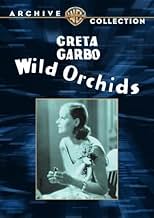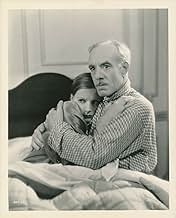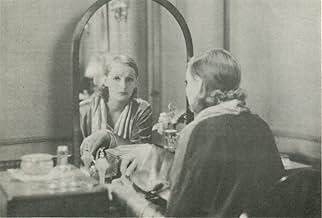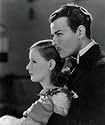A prince in Java tries to seduce his visitor's wife, but he's discovered.A prince in Java tries to seduce his visitor's wife, but he's discovered.A prince in Java tries to seduce his visitor's wife, but he's discovered.
- Awards
- 3 wins total
6.4798
1
2
3
4
5
6
7
8
9
10
Featured reviews
MGM gets its money's worth out of Garbo in 1929
MGM had Greta Garbo quite busy making films during 1928 and 1929 as the studio saw the approach of sound film possibly destroying one of their top assets. Nobody knew what the outcome of Garbo's career would be at the time.
Thus Greta Garbo made silents until 1930's "Anna Christie". This silent film is not really silent at all. It has a very sophisticated score for its time, including sound effects, crowd noises, and even singing during musical numbers, with long shots of the singers so you can't see that there is no true synchronization with the singers themselves.
The story is that of 50ish John Sterling (Lewis Stone) and his young wife, Lillie (Greta Garbo). The two are embarking on a cruise to Java so that John can mix business with pleasure. His business is to look over some plantations that he may buy. The pleasure is his desire to hunt and shoot a tiger while in Java. On the boat the couple meet Prince De Gace, played by Nils Asther. John is by no means a neglectful husband, but at age 50 he has largely left his romantic days behind him. This makes Lillie a likely target for the charming prince and his silver tongue. He makes a play for her right off the bat, and continues his chase as the Sterlings remain guests in his home. Lillie is torn, but tries her best to avoid the prince and his advances. One night during their stay, after returning from a day of looking at plantations, John sees the silhouettes of the prince and Lillie on the drawn shade of the house just after the prince has grabbed her for a quick kiss. What will John do about this situation? The acting in this film is quite well done. Asther comes across well as the slimy but attractive prince, and Lewis Stone was a wonderful silent actor. His surprise when he first sees the couple in an embrace, and his look of both great disdain and knowing when he later sees the prince flirting with a servant girl says it all. Yet, like Garbo, some of his best performances would come with talking pictures where he could both artfully play the cad in the MGM precodes as well as Judge Hardy of the Andy Hardy series fame.
Existing prints of this film are quite well preserved, and I highly recommend it for silent film enthusiasts.
Thus Greta Garbo made silents until 1930's "Anna Christie". This silent film is not really silent at all. It has a very sophisticated score for its time, including sound effects, crowd noises, and even singing during musical numbers, with long shots of the singers so you can't see that there is no true synchronization with the singers themselves.
The story is that of 50ish John Sterling (Lewis Stone) and his young wife, Lillie (Greta Garbo). The two are embarking on a cruise to Java so that John can mix business with pleasure. His business is to look over some plantations that he may buy. The pleasure is his desire to hunt and shoot a tiger while in Java. On the boat the couple meet Prince De Gace, played by Nils Asther. John is by no means a neglectful husband, but at age 50 he has largely left his romantic days behind him. This makes Lillie a likely target for the charming prince and his silver tongue. He makes a play for her right off the bat, and continues his chase as the Sterlings remain guests in his home. Lillie is torn, but tries her best to avoid the prince and his advances. One night during their stay, after returning from a day of looking at plantations, John sees the silhouettes of the prince and Lillie on the drawn shade of the house just after the prince has grabbed her for a quick kiss. What will John do about this situation? The acting in this film is quite well done. Asther comes across well as the slimy but attractive prince, and Lewis Stone was a wonderful silent actor. His surprise when he first sees the couple in an embrace, and his look of both great disdain and knowing when he later sees the prince flirting with a servant girl says it all. Yet, like Garbo, some of his best performances would come with talking pictures where he could both artfully play the cad in the MGM precodes as well as Judge Hardy of the Andy Hardy series fame.
Existing prints of this film are quite well preserved, and I highly recommend it for silent film enthusiasts.
A fascinating silent film
Superb production values and subtle, clever performances by the three major stars in this film (Greta, Nils, and Lewis) make this silent film absolutely fascinating - and fun - to watch. From the moment Greta's character meets Nils' character in the hallway of the cruise ship, as he viciously strikes his servant, while she appears shocked and disgusted, yet intrigued, the stage is set for a great tug of war of emotions and a battle of wills between the major characters, which keeps the audience mesmerized throughout.
If you have only seen Greta in her talkie films from the 1930's then you really have never understood why she became so popular in the first place, or why she was considered a great beauty. Her mystery and allure on film began in the silent era of the 1920's. By the time she appeared in her talkie films her face was more set, more mature, more of a woman's face. In the 1920's she still looked like a young girl, and her beauty and refreshing elegance were more striking.
Lewis Stone has the benefit here of receiving some of the best and funniest lines in the picture. As the Prince, played by Nils, shows Lewis and Greta to their bedroom in his Javanese palace, where they will stay as guests, a king size bed is revealed. Lewis's eyes open wide and he whispers to Greta in shock, "Good Lord, a double bed!" This was something new for a married couple on screen in 1929! I burst out laughing.
Great film, with a wonderful ending. Don't miss it.
If you have only seen Greta in her talkie films from the 1930's then you really have never understood why she became so popular in the first place, or why she was considered a great beauty. Her mystery and allure on film began in the silent era of the 1920's. By the time she appeared in her talkie films her face was more set, more mature, more of a woman's face. In the 1920's she still looked like a young girl, and her beauty and refreshing elegance were more striking.
Lewis Stone has the benefit here of receiving some of the best and funniest lines in the picture. As the Prince, played by Nils, shows Lewis and Greta to their bedroom in his Javanese palace, where they will stay as guests, a king size bed is revealed. Lewis's eyes open wide and he whispers to Greta in shock, "Good Lord, a double bed!" This was something new for a married couple on screen in 1929! I burst out laughing.
Great film, with a wonderful ending. Don't miss it.
Garbo goes east
Wild Orchids casts Greta Garbo as the younger wife of Lewis Stone and they are bound for what was then called the Dutch East Indies. On the ship they meet a Javanese potentate Nils Asther a fellow Swede to Garbo who looks seductively at Garbo and that's all she wrote.
There's a wonderful scene in Wild Orchids where Garbo encounters Asther giving a beating to one of his servants who did not move as quickly as he would like. Garbo may have had the best face for closeups in the history of cinema. Remember this is a silent film so no dialog, but the looks Asther gives her and her closeups, a mixture of horror at the barbarity, but fascination with the man tells more than 50 pages of dialog or title cards.
Asther invites her to Javanese palace and Garbo and Stone are loving it. But eventually Stone catches on and it all comes to a climax during a tiger hunt.
Asther got to do another Asian portrayal in Frank Capra's The Bitter Tea Of General Yen. Some interesting roles for a Scandinavian, yet another of his countryman Warner Oland also played a noted Oriental with Charlie Chan.
Lewis Stone has the distinction of being the player who did the most appearances with Garbo. He comes over well as the concerned and most jealous husband.
Definitely a must for Garbo fans and those wanting to get acquainted with her work.
There's a wonderful scene in Wild Orchids where Garbo encounters Asther giving a beating to one of his servants who did not move as quickly as he would like. Garbo may have had the best face for closeups in the history of cinema. Remember this is a silent film so no dialog, but the looks Asther gives her and her closeups, a mixture of horror at the barbarity, but fascination with the man tells more than 50 pages of dialog or title cards.
Asther invites her to Javanese palace and Garbo and Stone are loving it. But eventually Stone catches on and it all comes to a climax during a tiger hunt.
Asther got to do another Asian portrayal in Frank Capra's The Bitter Tea Of General Yen. Some interesting roles for a Scandinavian, yet another of his countryman Warner Oland also played a noted Oriental with Charlie Chan.
Lewis Stone has the distinction of being the player who did the most appearances with Garbo. He comes over well as the concerned and most jealous husband.
Definitely a must for Garbo fans and those wanting to get acquainted with her work.
Garbo excels in exotic love triangle romance...no spoken dialog...
Although there is a fine background score and many sound effects throughout, neither GRETA GARBO, LEWIS STONE nor NILS ASTHER speak a word of dialog in this MGM film directed by Sidney Franklin during the dawn of sound films.
With the use of the usual title cards for the spoken words and some excellent emoting from the three stars, the viewer becomes absorbed in what is essentially a handsomely produced love triangle set aboard a cruise ship heading for Java. Even as early as 1929, MGM's glossy production values are evident.
Garbo is the restless wife of the middle-aged Lewis Stone when she first sets eyes on princely Nils Esther aboard ship, fascinated as she watches him brutally whip a slave. When fascination turns to disgust, she rebuffs his advances when he has an opportunity in Java to be alone with her while her husband goes on a hunting trip. Predictably, she is soon under his spell and that's when the plot begins to turn.
Stone is adept at portraying the husband's emotions when he believes his wife unfaithful and Nils Asther is so perfectly cast that I wish he'd made more American films in the future rather than return to his native Sweden. As for Garbo, she has never looked more beautiful nor more youthful before her features matured.
Although the plot is a simple one, there's enough interest in the trio to assure attention until the final shot.
With the use of the usual title cards for the spoken words and some excellent emoting from the three stars, the viewer becomes absorbed in what is essentially a handsomely produced love triangle set aboard a cruise ship heading for Java. Even as early as 1929, MGM's glossy production values are evident.
Garbo is the restless wife of the middle-aged Lewis Stone when she first sets eyes on princely Nils Esther aboard ship, fascinated as she watches him brutally whip a slave. When fascination turns to disgust, she rebuffs his advances when he has an opportunity in Java to be alone with her while her husband goes on a hunting trip. Predictably, she is soon under his spell and that's when the plot begins to turn.
Stone is adept at portraying the husband's emotions when he believes his wife unfaithful and Nils Asther is so perfectly cast that I wish he'd made more American films in the future rather than return to his native Sweden. As for Garbo, she has never looked more beautiful nor more youthful before her features matured.
Although the plot is a simple one, there's enough interest in the trio to assure attention until the final shot.
Mediocre silent
This film seems a lot like a warm-up for The Painted Veil, another Garbo ego picture which would be released in 1934. The story is similar, the locale is in Asia, she has a much older, boring husband, a new, exciting lover...
I could go on and on about how similar they are.
It's not technically a silent movie, rather a sound movie without dialogue, and perhaps that's its only redeeming quality. The sets are nice, but the intertitles do get a little corny (and aren't overly inventive).
Garbo would go onto better things, but for now she was still making silent pictures in an era where even Gloria Swanson had transferred to sound.
Greta Garbo is quite pretty in this film, and she gets to wear a lot of nice costumes, but she isn't given much to do other than that.
I was rooting for the husband more than I was rooting for the lover, so the Hollywood happy ending was welcome. The tiger hunt was probably the best part of the film.
I preferred The Painted Veil, not because I'm a silent movie-phobe (because I am not), but because her leads are more colorful and she's given more to do than be a window decoration.
I could go on and on about how similar they are.
It's not technically a silent movie, rather a sound movie without dialogue, and perhaps that's its only redeeming quality. The sets are nice, but the intertitles do get a little corny (and aren't overly inventive).
Garbo would go onto better things, but for now she was still making silent pictures in an era where even Gloria Swanson had transferred to sound.
Greta Garbo is quite pretty in this film, and she gets to wear a lot of nice costumes, but she isn't given much to do other than that.
I was rooting for the husband more than I was rooting for the lover, so the Hollywood happy ending was welcome. The tiger hunt was probably the best part of the film.
I preferred The Painted Veil, not because I'm a silent movie-phobe (because I am not), but because her leads are more colorful and she's given more to do than be a window decoration.
Did you know
- TriviaDuring production Greta Garbo's friend and mentor, Mauritz Stiller, died in Sweden. Devastated by his death, Garbo traveled to Sweden incognito to mourn his death. Her secretive travel plans were quickly foiled when she was recognized on the voyage.
- Quotes
Prince De Gace: The East is a country of the senses - warm, mysterious - like the kiss of a lover.
- ConnectionsFeatured in The Divine Garbo (1990)
- SoundtracksYou Are Like Wild Orchids
- How long is Wild Orchids?Powered by Alexa
Details
- Release date
- Country of origin
- Language
- Also known as
- Divlje orhideje
- Filming locations
- Production company
- See more company credits at IMDbPro
Box office
- Budget
- $322,000 (estimated)
- Runtime
- 1h 40m(100 min)
- Sound mix
Contribute to this page
Suggest an edit or add missing content


























